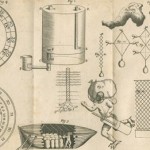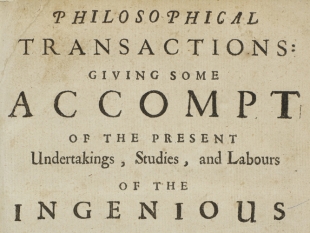 The world’s oldest scientific academy, the Royal Society, has made their journals available online. For free! Permanently!
The world’s oldest scientific academy, the Royal Society, has made their journals available online. For free! Permanently!
What’s the Royal Society you say? The RS is the world’s oldest scientific publisher. Having its first published article in 1665. Scientific articles relating to The Plague, lightning strikes and “inhabitants of the Moon” make up the huge, 60,000 article database from contributors such as Darwin, Newton and other scientists.What type of articles could one find in such an enormous collection? Well, stuff like this:
A canine blood transfusion, 1666
Thomas Coxe wrote about an early blood transfusion from one dog to another. He transferred blood from a dog suffering from mange into a healthy one – to see if the healthy dog would be infected.
First he procured “an old mongrel cur, all over-run with the mange” and fed it up with “cheese parings and milk”. He then transfused about 14oz or 16oz (397g to 434g) of its blood into the veins of a healthy spaniel. The effect of the experiment was no change in the healthy dog and the mangy dog was “perfectly cured” in 10 days.
And the stories only get weirder and weirder. Articles on what the view of Earth s like for those inhabitants of the Moon and other creepy topics make for a fun Halloween read. If you’re into that sort of stuff. Which I assume that you are since you read GhostTheory. Make sure to read through the database by visiting the RS website.
14 comments-Source: Royal Society
The Royal Society has today announced that its world-famous historical journal archive – which includes the first ever peer-reviewed scientific journal – has been made permanently free to access online.
Around 60,000 historical scientific papers are accessible via a fully searchable online archive, with papers published more than 70 years ago now becoming freely available.
The Royal Society is the world’s oldest scientific publisher, with the first edition of Philosophical Transactions of the Royal Society appearing in 1665. Henry Oldenburg – Secretary of the Royal Society and first Editor of the publication – ensured that it was “licensed by the council of the society, being first reviewed by some of the members of the same”, thus making it the first ever peer-reviewed journal.
Philosophical Transactions had to overcome early setbacks including plague, the Great Fire of London and even the imprisonment of Oldenburg, but against the odds the publication survived to the present day. Its foundation would eventually be recognised as one of the most pivotal moments of the scientific revolution.
Professor Uta Frith FRS, Chair of the Royal Society library committee, said: “I’m delighted that the Royal Society is continuing to increase access to its wonderful resources by opening up its publishing archives. The release of these papers opens a fascinating window on the history of scientific progress over the last few centuries and will be of interest to anybody who wants to understand how science has evolved since the days of the Royal Society’s foundation.”
Treasures in the archive include Isaac Newton’s first published scientific paper, geological work by a young Charles Darwin, and Benjamin Franklin’s celebrated account of his electrical kite experiment. And nestling amongst these illustrious papers, readers willing to delve a little deeper into the archive may find some undiscovered gems from the dawn of the scientific revolution – including accounts of monstrous calves, grisly tales of students being struck by lightning, and early experiments on to how to cool drinks “without the Help of Snow, Ice, Haile, Wind or Niter, and That at Any Time of the Year.”






